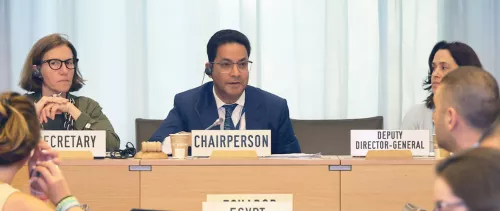
Webinar discusses leveraging digital technologies to revolutionize customs operations
The WTO hosted on 10 June the third session in its webinar series on trading goods in the digital era, showcasing the transformative potential of digital technologies in customs operations and the need for continued innovation and collaboration.
The webinar emphasized the increasing adoption of technologies such as electronic data interchange, blockchain, artificial intelligence and big data analytics by customs authorities. The moderator, Suja Rishikesh Mavroidis, Director of the WTO’s Market Access Division, underscored the importance of understanding the practical applications of these technologies to assess their effectiveness.
The event featured a panel of expert speakers from around the world who provided insights into the current use and future potential of digital technologies in customs operations and discussed the challenges in implementing these technologies. More than 465 participants from over 120 WTO members joined the webinar online.
Brightwell Nkambule, the Commissioner General of the Eswatini Revenue Service, talked about a project focused on automating data exchanges between traders and customs. This initiative aims to streamline trade processes and ensure that resources are used efficiently in the region, benefiting both traders and border agencies.
Wai Yee Choo, Director of the Networked Trade Platform (NTP) Office in Singapore, introduced the NTP, a global network designed to enable the efficient flow of goods and services through secure data exchange. The NTP aims to create value and positive impact for stakeholders by improving efficiency, reducing risks, and ensuring the smooth flow of goods. The platform focuses on streamlining domestic interactions, facilitating seamless government-to-government digital connectivity, and developing trusted government data services.
Eng. Khalid Hasan Ali Al Marzooqi, Director of the Development and Strategic Planning Division at Abu Dhabi Customs, emphasized the importance of adopting new technologies and maintaining a forward-looking approach to continuously improve customs operations and efficiency. He highlighted the integration of artificial intelligence and blockchain into their operations. He also presented the strategic plan, which focuses on trade facilitation, revenue management, customs security and digital transformation.
Nino Jincharadze, Head of the Project Management and Development Division at the IT Center of the Georgian Revenue Service, discussed the use of AI and robotics in automating customs processes. She highlighted the positive impact of digitalization on various customs indicators and the importance of selecting the correct technology and customizing it to specific needs.
Norbert Kouwenhoven, Special Advisor on Strategy and Innovation at the Customs Administration of the Netherlands, emphasized the role of AI and data in enhancing customs operations, particularly in detecting suspicious shipments. He underscored the necessity of continuously improving AI capabilities, ensuring high data quality, and fostering collaboration with various entities to secure better training data. Mr Kouwenhoven also talked about the challenges associated with technology implementation, political considerations, legal issues, and the need to maintain a human touch in the process.
As customs authorities around the world adopt digital technologies, the goal is to enhance trade efficiency, security, and inclusivity, paving the way for a more connected and streamlined global trade environment, the speakers emphasized.
Full details about the webinar are available here.
Previous webinars in this series have focused on the impact of COVID-19 on trading goods digitally and the use of digital technologies to improve supply chain procedures.


